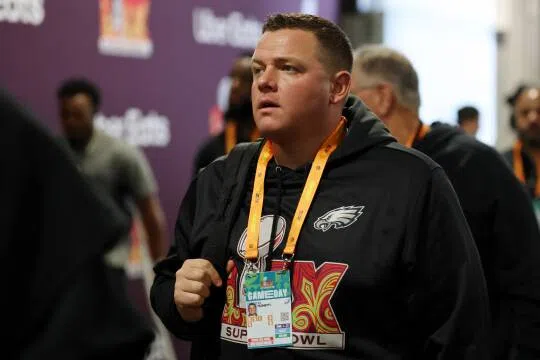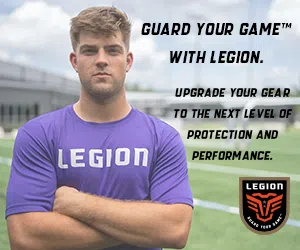By Ross Jackson
NEW ORLEANS, La. – Eleven years gao, T.J. Paganetti accepted his first NFL coaching job. This year, he accepted his first with a new team, landing the role of run game coordinator with the New Orleans Saints. Now, he is likely to be the team’s secret weapon in bringing the rushing attack back to the Big Easy.
The Saints have been a middling rushing team since the 2020 season, often hovering between the middle of the pack into the 20’s each season since then. Paganetti brings the energy, skills and track record with him to help the team take a step forward.
“I think New Orleans should be very excited about the team that they’re going to field this year,” Paganetti told Louisianasports.net in an exclusive interview, his first ever media interview as an NFL coach.
The Track Record
Paganetti had first been an intern or student assistant focusing on the offense at Oregon, his alma mater. He worked with one of the most dynamic and innovative minds in college football during that time in Chip Kelly, whom he followed to the NFL in 2013.
He would then go on to spend the majority of the next decade-plus with the Philadelphia Eagles, returning for two seasons to Oregon in 2015 and 2016 as a graduate assistant.
Paganetti went from working extensively with Kelly and his innovative offensive schemes at both the college and pro levels to working closely with one of the best offensive line coaches ever in the NFL, Jeff Stoutland. When Paganetti returned to the NFL in 2017, he was hired as an offensive quality control coach and assistant offensive line coach.
He then bounced around to different offensive positions, working with the offensive line then running backs to tight ends and then offensive line again in 2024, adding the run game specialist title over the last two years. During his final year in Philadelphia, he worked with now-Saints head coach Kellen Moore, which is what helped get him to New Orleans.
Why Longevity Matters
It’s rare that a coach lands with a team and sticks with them for essentially a decade. But like Stoutland, Paganetti stuck it out with the Eagles for a time and the team enjoyed the success that he helped to generate. Paganetti credits part of that success to the longevity the team has had in building its system and the collaborative approach he and Stoutland helped to foster.
“You’ve got (Stoutland) there,” he said. “Who’s been there since 2013 playing. Everybody teaches each other and coaches each other. And it’s almost like that room in Philly is the way it is right now, because everybody coaches each other. But it’s also these techniques that have been combed through and put together over a decade.”
For almost every year that Paganetti was close to the run game in Philadelphia, the Eagles were a top-ten rushing offense. The only exceptions were the 2018 and 2019 seasons.
In 2018, the rushing offensive ranked No. 28 in the league. The running back room, which included former Saints back Darren Sproles along with veteran Jay Ajayi, had been struck with injury coming off of a Super Bowl season that featured the final year of LeGarrette Blount as an Eagle.
In 2019, the running back room was almost completely changed with the free agency addition of Jordan Howard and draft selection of running back Miles Sanders. The run game finished No. 11 that season.
Every other year, whether Paganetti was working with offensive line, running backs, tight ends or as a quality control coach, the team finished top-ten in rushing yards. While he wouldn’t take the credit for those rankings all to himself, he was a part of the core staff that helped the team get there. Now, he brings those skills and that knowledge to New Orleans.
The Players See It Too
Ask any player about Coach Paganetti and you’ll hear two consistent things. You’ll hear about how smart and creative he is and you’ll hear about how he develops good relationships with the players he coaches.
Tight end Jake Stoll was with both Moore and Paganetti in Philadelphia and came over to New Orleans to join their roster. He gave a glowing review of the run game coordinator based on his previous experience.
“He’s just a phenomenal offensive mind,” Stoll said. “I think that’s what makes him so great. And he creates great relationships with the players. When I was in Philly, he was an assistant tight ends coach for a year, and we had a great time when he was in the room. So, he does a great job of mixing with the players, and still using his knowledge to the best of his ability.”
The idea of creating relationships with players is a sentiment often highlighted by players when discussing this new coaching staff as a whole. It means a lot to them.
“I think the coaches want to be a part of the team,” offensive tackle Taliese Fuaga said. “It’s not just, you know, they’re just our coaches, they’re our higher ups, but it’s more like we’re all kind of buddy-buddy. We’re all, like, the same. We’re equal. We’re like brothers and we’re all in it for the game to win. So I think it’s pretty cool.”
Whether building relationships with the roster or building a dynamic rushing attack, Paganetti and the staff sound to be checking all of the boxes.
The Goal of the Run Game
With all of the knowledge he has, Paganetti summed up what the goal of the run game in New Orleans will be very concisely.
“We’re trying to create gaps, and we’re trying to create home runs for the running back,” he said.
The offensive scheme may be complicated, a blend of different rushing schemes, points of attack and philosophies, but the goal is simple, hit dingers. In order to generate those big plays, Paganetti says that the coaching staff is just as important as the players. If something goes wrong, it isn’t necessarily lack of execution. That’s something that the coaching staff will look at in their own self-critiques, which they are carrying over from Philadelphia.
“We would do relentless self-scouting,” he said. “Which we’re going to carry over here and I’m super excited about that. Every week, ‘Why did this play not work? Okay, it didn’t work because of this.’ Basically, whose fault is that? Is it our fault? Is it because this guy stepped wrong? Is it because this guy’s split was not right? Like, it’s just relentless. If it’s a mental error, then we can correct that. If it’s a schematic error, then that’s on us, and we need to change it.”
The notion goes far with players, who feel that this kind of self-awareness from their coaching staff aligns them in their goal to improve, rather than places blame directly on the roster.
“Them saying that, it’s a big help for us,” Fuaga said. “Because we know that, yeah, there’s going to be some bad plays. But it’s not always on us, even though we are the ones playing out there. Maybe a bad call, whatever. And they own up to it, then that’s great.
The Simple Things
Before that, self-scouting is necessary, though Paganetti and the staff take important care to get things right ahead of time. Transparency, goal-setting and a sense of accountability are all present in the way the team will prepare. The coaches are looking to instill a sense of “why” over the sense of simple “what.”
“If you give that player that kind of knowledge ahead of time” Paganetti said. “And show them the picture of how that fits and how you make this block work, that the player then has some juice behind him. Like, ‘I’m gonna become a psychopath to block this guy.’ And if the guy can’t do that on a certain play, then you don’t ask him to do it. You run a different play. It’s just that simple.”
But don’t expect to see this staff asking players to do things that don’t make sense, or that they struggle to achieve. That’s counter-intuitive to a rule Paganetti has — a rule that makes him one of the most successful and innovative coaches in his area of expertise, no matter how simple it sounds.
“We do things that make sense and are fair to the players,” he said. “We don’t put them in positions that suck.”






